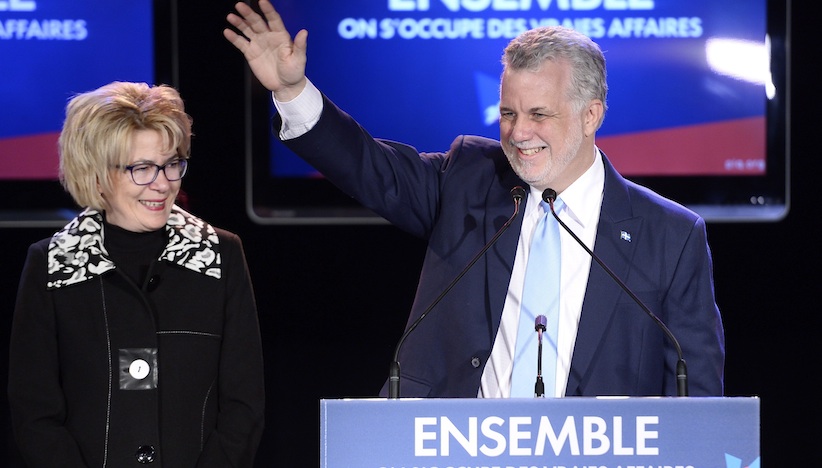Editorial: Time to co-operate with Quebec
Let’s get on with making Canada the best country in the world—together
Quebec Liberal leader Philippe Couillard and his wife Suzanne Pilote take the stage after winning the provincial election Monday April 7, 2014 in St-Felicien, Que. THE CANADIAN PRESS/Jacques Boissinot
Share

Quebec’s perpetual state of referendum preparation—what was once called “the Neverendum”—has come to a screeching halt. This week’s stunning rejection of Pauline Marois’s Parti Québécois and the majority victory by the Liberals under Philippe Couillard has created the most openly federalist government in Quebec since the appearance of the PQ nearly half a century ago. This may be the last we hear about Quebec separatism for a very long time.
While she began the election ahead in the polls, Marois proved to be her own worst enemy. Her introduction of billionaire Pierre Karl Péladeau as star candidate—and his pledge to “make Quebec a country”—turned out to be the pivotal moment in the campaign. Forced to put separatism on the table, Marois found herself enmeshed in the nitty-gritty of what it would entail: from a monetary union to how the borders would operate. The result was an instant sense of revulsion among many francophone voters. It turns out they’re just as tired of talk about splitting up Canada as is the rest of the country.
According to polling by Ipsos-Reid late in the campaign, the dominant issue during the election’s home stretch was a strong desire to avoid another referendum. This outweighed both the economy and leadership integrity, the two issues that were top of mind with voters before Péladeau entered the race. Among declared Liberal supporters, more than a third told the pollster they were voting for Couillard’s ticket solely because of his promise to steer clear of separation. By bringing up sovereignty, Marois drove voters straight into the arms of her competitor. She also lost her own seat.
That said, the problems for the sovereignist movement go far beyond any tactical errors made by the PQ during the election. Observed from a distance, it seems clear the movement is facing grave, existential difficulties with or without the assistance of Marois.
In 1980, when Quebec held its first referendum, separatism was widely regarded as the crusade of the young. According to research by Claire Durand, a sociologist at Université de Montréal, on the eve of that vote, 63 per cent of francophones aged 18-34 supported sovereignty, the strongest showing among all age groups. Fifteen years later, during the narrow federalist victory in the 1995 referendum, both the 18-34 and 35-54 age groups expressed over 60 per cent support. If such a trend had continued, a successful referendum would be all but inevitable today. Instead, the trend collapsed.
Young francophones now express the lowest level of support for sovereignty, at 39 per cent. No age group breaks above 50 per cent. What explains such a turnaround? It could be the vast array of protections currently offered to the French language within Quebec that has removed much of the angst over the survival of Québécois culture. Or perhaps the generous accommodations offered to Quebec by successive federal governments. Or it may be simple exhaustion. Regardless, it looks like it’s here to stay.
Despite Marois’s best efforts to incite division within Quebec society via the obnoxious charter of values and its ban on religious symbols for public servants, pluralism is becoming a vital component of Quebec’s future. To arrest its relative population decline within Canada, the province has increasingly looked to immigration for growth. As a result, young visible-minority francophones from Africa now represent the largest single component of new immigrants. The more cosmopolitan the province becomes, the more difficult it will be for future politicians to draw lines between us and them.
Of course, it is a stretch to declare separatism dead and buried. As an expression of nationalist identity, as well as a means of leveraging preferential treatment by the rest of the country, the spectre of sovereignty will never truly disappear. And for a sizable portion of the francophone community, the dream of maître chez nous will always have appeal. But it will be increasingly difficult to muster majority support for the concept.
The fact Couillard ran the most unabashedly federalist campaign in Quebec in memory and was rewarded with a handsome majority should be cause for celebration across Canada. “We are a free people, we are a happy people,” he said on the campaign trail last month. “I see no reason to deprive Quebec of Canadian citizenship.”
By corollary, it now seems equally true that there’s no reason for the rest of Canada to fear they will be deprived of Quebec. We can all live chez nous—and get on with the business of making Canada, the best country in the world, even better.